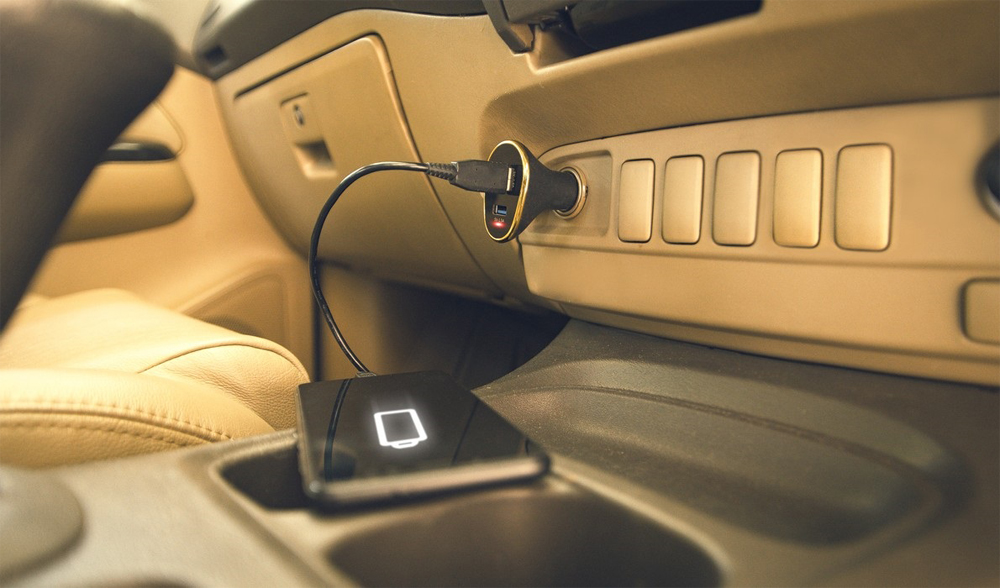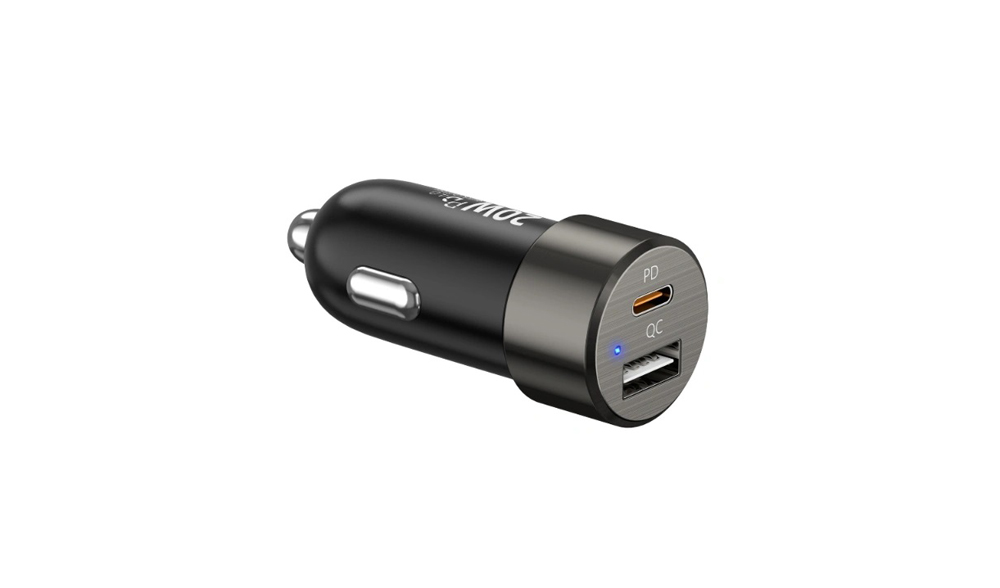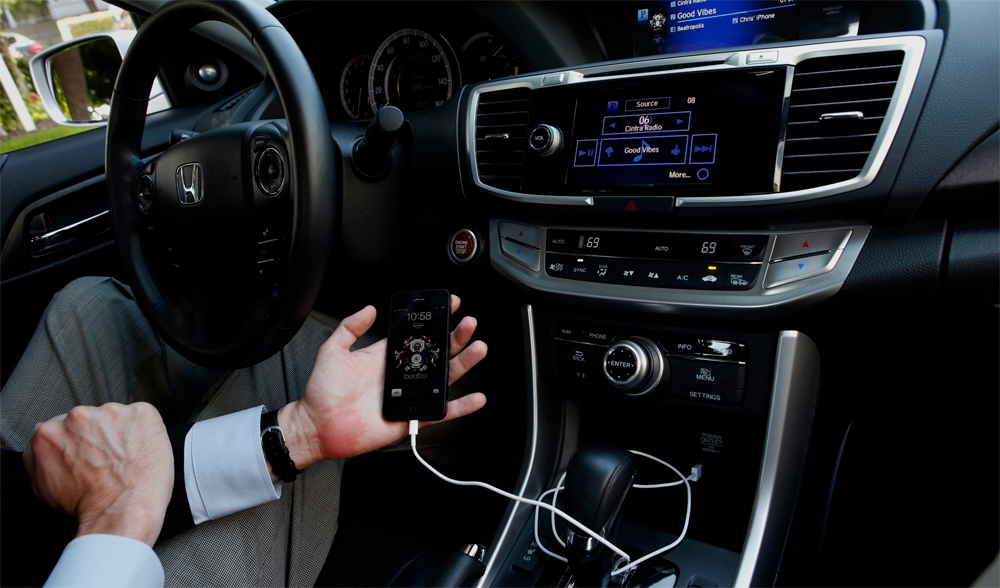While your car is in operation, it utilizes its own battery to power the various electronic components it requires. Just like in your vehicle, any digital or powered accessory or feature in your car relies on drawing electrical current from the battery. The same principle applies to your smartphone as well, as it needs to draw power from its own battery to operate.
When charging your phone in your vehicle, you will use a specialized charger that plugs into the car’s power source. This charger will have a distinct end port and adapter, which may differ from the standard charger you typically use for your phone.

When using a car charger, one end of the charger is inserted into a large, circular port located on the dashboard of your vehicle. Most modern cars are equipped with this type of port, commonly known as a lighter port. However, it is worth noting that certain car models may have alternative purposes designated by the manufacturer for this port.
Due to the prevalence of car chargers in today’s vehicles, some car models may include dedicated charging ports specifically designed for this purpose. These ports may be located in different areas of the vehicle besides the dashboard. Additionally, certain vehicles may feature advanced technology that enables wireless charging for your phone while on the go.
Nevertheless, it is important to note that car chargers require specific adapters. Similar to when charging your phone at home, the current supplied by a car battery is too high for the internal electronics of a standard smartphone to handle. If this high current were to flow through an unmodified phone, it would overload the circuits and potentially cause irreversible damage to the device.
Hence, the adapter included in a car charger plays a crucial role in converting the high-powered current from the vehicle into a lower and more suitable form of power that a phone can safely handle.
Your phone’s car charger functions by drawing power from the vehicle’s battery, reducing it to an appropriate voltage level, and utilizing that power to charge the battery within your smartphone. It brings great convenience to the use of mobile phones. That’s why so many car owners need them.
Do car chargers require gas to work?
Indeed, using car chargers to charge your phone while driving will consume a slightly greater amount of fuel compared to not using them at all. As we discussed earlier, the vehicle’s battery supplies the charge, but the engine needs to exert a slightly higher effort to meet the increased demand for battery current.
To provide a more precise explanation, the car engine may need a slightly higher torque to drive the alternator. The car charger generates a field that opposes the direction of the vehicle’s alternator. As a result, the engine exerts additional force to overcome this opposition and ensure the alternator continues to function properly.
While it may initially seem like a significant strain on the car’s engine, the impact of using a car charger is generally minimal. In reality, the additional work or energy required by the engine is typically considered negligible by most standards. For instance, a gallon of gasoline contains several kilowatt hours of energy that the car can utilize, highlighting the relatively small effect of charging a phone via a car charger in comparison.
In the best-case scenario, a car charger may draw approximately five watts continuously to charge your phone’s battery. This represents an extremely minimal increase in the overall energy requirements of the car’s battery and fuel tank to provide the convenience of keeping your phone charged while on the go.
In reality, there are numerous factors that have a more noticeable impact on your vehicle’s mileage or gas efficiency than simply charging your phone. Factors such as driving smoothly, reducing unnecessary distances, minimizing frequent stops and starts in traffic, and utilizing other power-consuming features in the car all play significant roles in determining how much mileage you can get out of a single tank of gas. These aspects have a more substantial influence on overall fuel consumption compared to the relatively minor impact of charging your phone.

Is it safe to leave a USB car charger plugged in and active in a vehicle?
Leaving a car charger plugged in while in the vehicle is generally safe, regardless of whether the phone is connected or not. However, it’s important to note that power draw may vary depending on the specific scenario. Some car models have switched sockets, while others do not.
In the case of switched sockets, the car is designed to deactivate those ports after a period of inactivity. Consequently, devices connected to these ports should not draw any power when they are not in use.
Even if your vehicle has a socket that remains active without an automatic shut-off feature, the power draw from leaving your car charger plugged in should be incredibly negligible. Modern smartphones are designed to cease charging once the battery reaches full capacity. This prevents the device from drawing excessive current and depleting the car battery unnecessarily.
When you take your phone with you, the car charger will only consume a minimal amount of energy to power an LED light indicating an active connection. Additionally, certain vehicle ports may automatically deactivate themselves instead. In such situations, the LED light on the charger will not be visible until you start the car again.
The only scenario in which a car charger could potentially impact the battery is if it remains connected to the charging port for an extended period, spanning several months, without starting the car during that time. In such cases, there is a slight possibility that the charger could gradually drain the battery over the prolonged duration.
Nevertheless, if you regularly start and use your car, leaving the charger plugged into any port should not have a discernible impact on the vehicle. The effect, if any, would be negligible and insignificant in practical terms.

Can car chargers work when a car is turned off?
It is possible to charge your phone using your car’s battery even when the vehicle is not running. In such cases, the car charger converts the battery power to an appropriate voltage to charge the smartphone’s battery. However, the availability of this feature can vary depending on the specific make and model of the vehicle.
In certain vehicles, the socket used for car chargers continues to receive power even when the vehicle is turned off. However, in other vehicles, the socket’s power supply is linked to the ignition of the car’s engine. If you own a vehicle of the former type, you should have the ability to charge your phone even when the car is not in operation.
Most reliable car chargers feature an indicator icon that lights up when they are charging the phone. You can check for this indicator to determine if your car is capable of charging your phone while the vehicle is switched off. However, it is important to be cautious as some cheap car chargers may utilize substandard components or construction.
Using low-quality car chargers poses a potential risk to both your phone and car battery if left plugged in unattended. These chargers may be prone to short circuits, smoke, or cause irreversible damage to the batteries of both devices. It is highly recommended to opt for chargers manufactured by reputable companies that are specifically designed for vehicle use to ensure safety and reliability.
Will leaving a USB device in a car drain a car’s battery?
When only the device is left plugged into the car charger, it will consume minimal battery power from the vehicle. The power usage is primarily attributed to providing energy to the LED indicators, which are typically present on the car charger, and the amount is extremely small.
In other cases, there are no power requirements from the car’s internal battery. Any substantial battery drain that might be noticeable over an extended period of time is highly unlikely, and most individuals would remove or replace their chargers long before such a situation arises.
Sum Up
When you’re away from home, by selecting a car charger can provide a convenient solution for charging your phone. Although the vehicle requires a slightly higher energy output to charge the phone, it is usually worthwhile to ensure that this essential device has the necessary power to keep you connected to various aspects of your business and personal endeavors.
